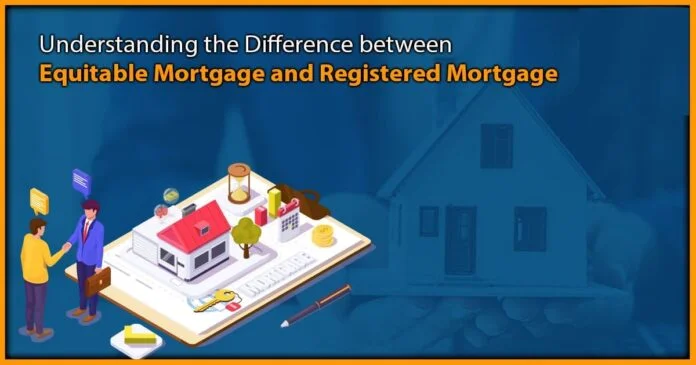Navigating through the complex world of home loans can be daunting. When it comes to understanding the nuances of different types of mortgages, most of us draw a blank. Two such mortgage types that often create confusion are equitable mortgages and registered mortgages.
These terms may seem intimidating, but a comprehensive understanding of both can help make informed decisions about your home loans.
Read on to find out all about equitable mortgage vs registered mortgage in India.
Understanding Mortgages: A Brief Overview
In simple terms, a mortgage refers to the security interest created on a property by a borrower to secure a loan from a lender. This process forms the bedrock of the home loan system, acting as a safety net for both borrowers and lenders. In India, two primary mortgage types are prevalent: Equitable and Registered.
Let’s delve deeper into these two categories.
What is Equitable Mortgage?
An equitable mortgage, also known as a mortgage by deposit of title deeds, is created when a borrower hands over the property’s title deeds to the lender.
Here’s what you need to know:
- An equitable mortgage is typically easier and faster to arrange as it does not involve the property’s registration with the government.
- It is generally less expensive as it saves the borrower from registration charges.
- It offers less security to the lender as the borrower retains physical possession of the property.
What is Registered Mortgage?
A registered mortgage, on the other hand, involves a formal agreement that is registered with the government authority.
Here are its main features:
- The process of obtaining a registered mortgage is usually lengthier and more expensive owing to registration costs and stamp duty.
- It provides greater security for the lender as it is officially recorded in public records.
- It offers clear proof of the loan agreement and the property’s encumbrance.
With a basic understanding of both types of mortgages, it makes sense to delve into the equitable mortgage vs registered mortgage comparison to see how they differ.
Key Differences Between Equitable and Registered Mortgages
Though both are ways of securing a home loan, the differences in their legal procedures, security, and loan approval process create a significant distinction.
- Legal Procedures: A registered mortgage involves the registration of the mortgage deed, ensuring all terms and conditions are legally binding. Equitable mortgages, are established through the mere transfer of property documents, and they do not require registration.
- Security for the Lender: A registered mortgage provides better security for lenders because it is enforceable in a court of law. Equitable mortgages, though enforceable, are often viewed as less secure due to the absence of a registered deed.
- Impact on the Loan Approval Process: While the more straightforward procedures of an equitable mortgage often expedite the loan approval process, registered mortgages may take longer due to the need for legal verification and registration.
Understanding Interest Rates and Loan Terms in Both Types of Mortgages
Irrespective of the type of mortgage, interest rates play a crucial role in determining the overall cost of the loan. Current market trends indicate that the lowest home loan interest rate is 9.5%. It is worth noting that the interest rates can vary depending on several factors, including the type of mortgage, the borrower’s credit score, and the lender’s policies.
The Role of CIBIL Scores in Mortgage Approval
A CIBIL score is a numerical representation of an individual’s creditworthiness and is a crucial component of the home loan approval process. Irrespective of the types of home loans in India, the minimum CIBIL score needed for loan approval is 700. A lower score might result in the rejection of a loan application, while a higher score can lead to better loan terms. Remember that a good CIBIL score does not guarantee anything. It merely enhances the chances of getting favourable terms.
Advantages and Disadvantages of Equitable and Registered Mortgages
Like everything else, both types of mortgages have their pros and cons.
- Equitable Mortgages: These are usually quicker and cheaper to arrange. They offer less security for the lender.
- Registered Mortgages: These provide more security for lenders due to registration with a government authority, but they can be more time-consuming and expensive due to legal procedures.
Loan to Value Ratio (LTV) in Mortgages
LTV is a critical factor in any home loan application. It is the proportion of the property’s value that a lender is willing to finance.
- For home loans, the maximum LTV can go up to 90%, depending on the borrower’s eligibility and the nature and value of the property.
- For Loan Against Property (LAP), the maximum LTV is generally up to 70-75%, again depending on the borrower’s eligibility and the property’s nature and value.
In Summary
Understanding the nuances of equitable mortgage vs registered mortgage is crucial for any potential borrower. While both offer unique benefits, the choice between them depends on individual circumstances, including the borrower’s financial situation, risk appetite, and long-term plans. By considering the key points discussed in this article, you can make a more informed decision that aligns with your financial objectives.

